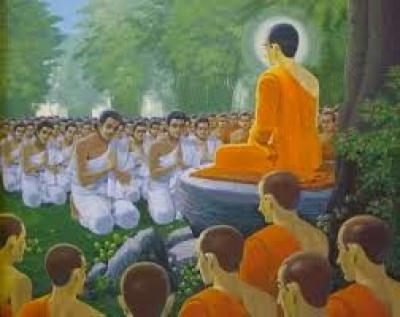 Nikini full moon day falling due one month after the commencement of “Wassana Kala“the rainy season: is of special significance for Buddhists due to a number of incidents that took place on this day.
Nikini full moon day falling due one month after the commencement of “Wassana Kala“the rainy season: is of special significance for Buddhists due to a number of incidents that took place on this day.
Attainment of Arahatship by the Buddha’s chief attendant, Ananda Maha Thera, commencement of the first Dhamma Sangayana, convocation to settle the Buddhist canon and “Pasu Vas” or the commencement of the “Vas” period by those who had not started the period of sojourn on the Esala full moon day are some of them. For Sri Lankans this day is further more significant because of the world famous Kandy Esala Perahera which normally ends on this day.
The rainy season in Dambadiva-India begins during the month of Esala (July – August). It is extremely cold in the snowy peaks of Himalayas and in the valleys where ascetics meditate under the shade of trees.
Due to cold weather and heavy rain it is not convenient for them to sit under trees and meditate. Even birds build sheltered nests to live in during this season with birdies. Some of them even migrate to other countries where there is less rain. Buddhist monks also sojourn with house holders during this season.
The “Pali” word “Vas” means the rains “Viseema” means dwelling. Therefore “Vas Viseema” means to sojourn during the rainy season. “Vassana Kala” or the rainy season of three months begins on Esala full moon day. Commencing the “Vas” period from Esala full moon day is called “Purmikawa” or “Pera Vas”. However the bhikkhus who could not commence the Vas period on Esala Full Moon day are allowed to start observing Vas on the Nikini Full Moon day. This is called “Pasuvas”.
Buddhist monks commence “Vas” on Nikini full moon day in keeping with the enactment called “Santhaha Karanaya” The circumstances which led to the enactment of “Santhaha Karanaya” was the hardships caused to the bhikkhus due to rain.
Nikini Poya day celebrates the first ever Dhammasangayana - The First Buddhist Council where, what the Buddha said, was agreed upon and recited. This took place at the Sattapanni Rock Cave in Rajagaha (now Rajgir, India), under the patronage of Mahakassapa Thera and it went on for seven long months. It established the original authentic Tipitaka: The 3 Baskets of Sacred Text = The Pali Canon spoken by the historical Buddha and his disciples.




